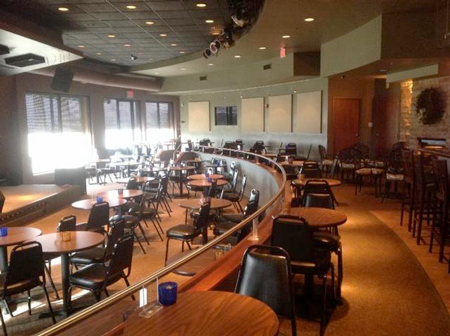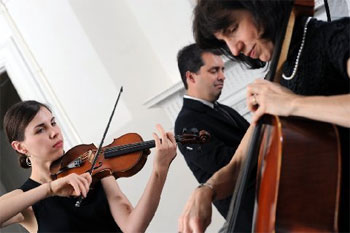by Daniel Hathaway

Chamber music is one possibility, and the school’s resident ensemble, the Almeda Trio, proved last Sunday afternoon that it serves that purpose remarkably well.
Violinist Cara Tweed, cellist Ida Mercer and pianist Robert Cassidy inaugurated this new chapter in the building’s history with a fresh and attractive program of music by Spanish and Argentine composers that suited the venue perfectly.
Set up in cabaret style with tables for two or four on two levels, the club can seat something like a hundred people with clear sightlines of the stage platform. You can even enjoy the proceedings when seated at the bar thanks to an array of big mirrors.
A lot of chamber music concerts are presented in churches — or in small halls where a semi-religious ambiance prevails. It may be jarring for some listeners to be able to order drinks and enjoy small plates during a performance, but that can radically enhance the listening experience. Hearing Joaquin Turina’s delightful Circulo, op. 91 served up with a glass of chardonnay and a bowl of Coconut Curry Butternut Squash Soup (topped with candied bacon, sour cream and chives, vegan option available) certainly engaged more of the senses than usual during a chamber music concert.
Circulo, by the way, follows the cycle of the Sun’s day in its three movements. Turina, who was born in Italy and lived and studied in Paris from 1905 to the beginning of the Great War until returning to Spain, was friendly with Debussy and Ravel and imbibed much of their musical style. The Almeda put across Turina’s narrative of A Day in the Life with verve and charm.
Astor Piazzolla’s Cuatro Estaciones Porteñas is the Tango Nuevo composer’s southern response to Vivaldi’s The Four Seasons. “The Four Seasons of Buenos Aires” — whose residents refer to themselves as “Porteños,” or those who arrived by sea — is a typically Argentine view of spring, summer, autumn and winter. Though this version lacks the special color of the bandoneón, the piece works well as a piano trio.
The Almeda captured most of the character of Piazzolla’s gripping musical style, but the sudden mood swings and explosive gestures that characterize Argentine Tango are difficult for North American musicians to emulate.
The hour-long program ended with Gaspar Cassadó’s Trio. Born in Barcelona, Cassadó studied cello with Casals and composition with Ravel in Paris, but spent his later career in Florence. His festive Trio is imbued with the whole-tone scales popular in early 20th-century French music, and its furioso ending brought this concert to an exciting conclusion.
The 50-some people in the audience gave the Almeda a warm round of applause. Though it sounded a bit odd when the Bop Stop’s host called the individual players out like jazzers at the end (“Cara Tweed on violin”), this event was an important step in allowing classical chamber music to let its hair down in an attentive but more informal setting.
Plus, the menu of six small plates, catered by Cleveland Culinary Launch & Kitchen and inexpensively priced, suited the occasion nicely. The soup was excellent.
Published on ClevelandClassical.com October 21, 2014.
Click here for a printable copy of this article



